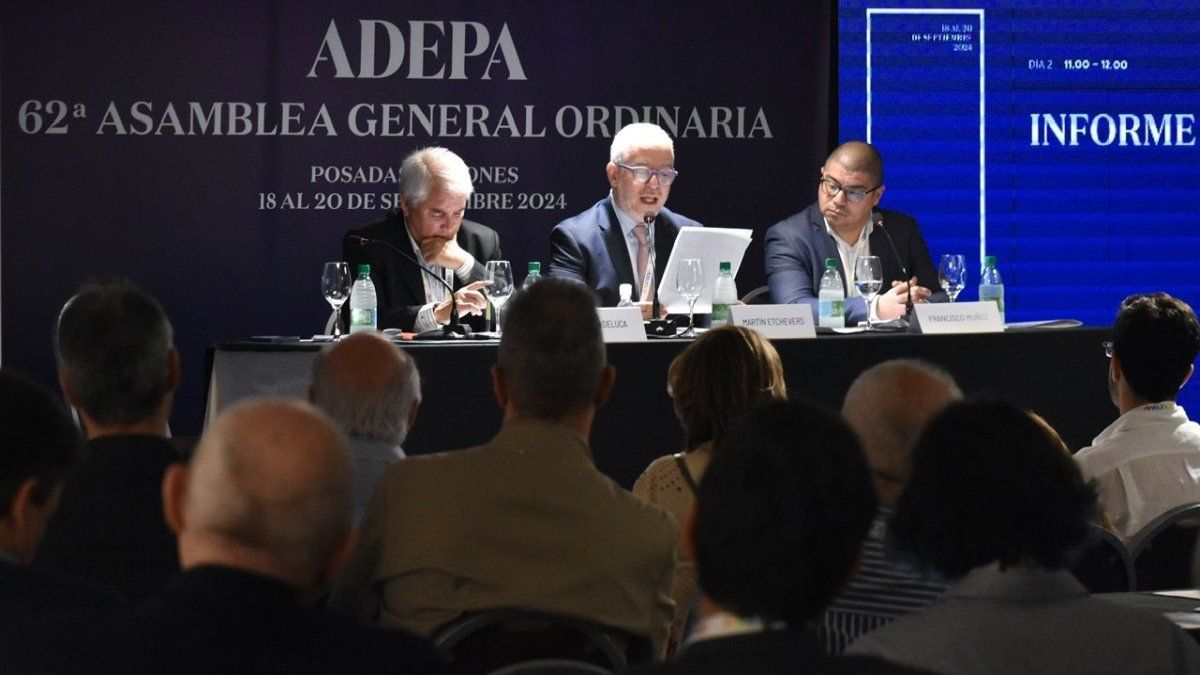The Association of Argentine Journalistic Entities (ADEPA) The 62nd General Assembly of the entity began, which is being held in the city of Posadas, Misiones. At the opening, its president Martin Etchevers, express: “ADEPA’s founding mission is to safeguard freedom of expression. As we know, it is a strategic freedom, and it is never consolidated, since it can be subject to more obvious and brutal restrictions – such as censorship, state persecution or physical harassment – or to more veiled and subtle movements, but which in a crescendo can have an equally pernicious effect: verbal aggression, intimidation, self-censorship, secrecy and ultimately, less transparency and auditing of power.”
“Free elections, separation of powers, legal security, independent justice and a free press are different aspects of this polyhedron,” Etchevers added. “And the professional press has an irreplaceable role, because in addition to its role in auditing public affairs, it is called upon to contribute rationality to an informed debate in society, a debate based on facts, data and reasoned opinions. A debate that transcends shouting, insults and anonymity.”
In his message to the assembly members gathered in Posadas, Etchevers, head of the most representative entity of the Argentine journalistic industry, listed and explained the institutional actions carried out since the end of 2023 and throughout 2024, among which the search for solutions to the agenda of challenges facing the journalistic industry throughout the country stood out, interacting with the three branches of government and with all political groups on concrete proposals.
“The sustainability of the press is subject to multiple challenges: technological, commercial, business model, use of our intellectual property, opaque intermediation of algorithms. Our task is to identify, point out and propose ways to address each of these challenges. And finally, we are committed to providing tools so that our partners can address from their own business and editorial structures the great changes posed by the digital revolution, AI and changes in the consumption and distribution of information. Our development and training areas reflect this.”Etchevers specified.
Etchevers commented that ADEPA created the Observatory of Sustainability of the Newspaper Industry more than three years ago, coordinated by Guillermo Ignacio, and made up of several members of its Executive Council. “This observatory has worked systematically in monitoring the evolution of several indicators and economic aspects of the industry, such as the institutional communication of the State, the transformation of print media and the emergence of native digital media,” he explained.
62nd Ordinary General Assembly ADEPA.jpg
In all the meetings that the entity has held with officials and legislators, various aspects of state communication have been worked on, such as access to public information and government sources, or the institutional communication scheme.
In all the meetings that the entity has held with officials and legislators, various aspects of state communication have been worked on, such as access to public information and government sources, or the institutional communication scheme. The latter is in accordance with what was stated in a document on principles prepared last year: for ADEPA, at the national, provincial and municipal level, official advertising should not be confused with a subsidy or used as a system of rewards and punishments by the governments in power.
“In the Argentine constitutional system, publicity of government actions is an obligation of the State to make public management transparent, provide services to citizens and allow society to audit government policies,” said Etchevers.
Another issue addressed throughout the period had to do with the demand by news media to be compensated by digital platforms for the use and distribution of their content, an issue that is increasingly relevant throughout the world. “It is a key area of our institutional work,” Etchevers stressed, “we must continue to defend the rights of editors over the value of content in the digital ecosystem and the recognition of these rights by platforms, which now also include Artificial Intelligence.”
While ADEPA has publicly highlighted that some global digital companies have begun to take steps towards recognising copyright on the internet, the organisation continues to advocate for this to be reflected more substantially in the economic equations of news companies. “An example of the complexity of this situation is Meta’s withdrawal from agreements with media outlets around the world, which has generated new uncertainties in the industry.”
Despite these challenges, ADEPA has managed to establish alliances with digital platforms to support media transformation processes throughout the country and facilitate access to financing and professional training opportunities. Through projects such as the Google News Initiative, which has been implemented for the eighth consecutive year, ADEPA partners have been able to access concrete benefits and high-level training.
Halfway through his report, the president of ADEPA referred to an institutional milestone that recently celebrated three decades. “Last August marked the 30th anniversary of the 1994 Constitutional Convention, and the entity reflected on the role that ADEPA played in that important social and political event. Guillermo Ignacio, then president of ADEPA, led the entity’s delegation in Santa Fe, which also included several industry leaders who are no longer with us.”
The 1994 Convention was a historic turning point for ADEPA in its defence of the constitutional guarantees of freedom of the press and freedom of expression. Freedoms, in the words of our historic constitutionalist Gregorio Badeni, are “cornerstones and strategic”, because they imply a reassurance for the exercise of other rights, in addition to being fundamental in themselves for the validity of republican democracy.”
Etchevers recalled that, in the face of the core of basic coincidences that promised the intangibility of the stone aspects of the Magna Carta, projects multiplied – ADEPA registered at least 20, including some very controversial ones, such as the one on truthful information – which called into question the standards that had nurtured that principle over decades, with peaceful jurisprudence that recognized precedents in the First Amendment to the United States and in transcendental rulings by the Supreme Court of Justice of our country.
“Our organization worked tirelessly during those sessions, presenting its perspective to the delegates, proposing to them to find formulas that did not deny modernity but that at the same time did not put at risk the Declarations, Rights and Guarantees that had proven to be the best ally of the expression of citizens and journalists,” said Etchevers. “The acumen of our experts – he added – made us pay attention to unknown institutions, such as habeas data, in a political context in which there was talk of advancing on the archives of the media. And it prompted us to propose the search for a superior solution, which ended up enshrining a cutting-edge right, which has been and continues to be a central safeguard for journalistic investigation: the confidentiality of sources.”
At the end of his report to the assembly members, Etchevers listed the actions of the internal committees of ADEPA, which will disseminate their reports throughout the two days of the Assembly. He mentioned the committees on Press Freedom, Multiplatform Training, Awards, Diversity, Digital Business Development, Local Media Development and Partners.
The agenda of the Assembly
This afternoon, a series of training and professional development activities will be held by Philippe Bernes Lasserre, director of AFP in Argentina; Nadia Nasanovsky, coordinator of training in digital research for Latin America at AFP; Juan Manuel Lucero, leader of the Google News Partnerships team in the Southern Cone; Julián Gallo, founder of Gallo Media; and Álvaro Liuzzi, digital media consultant and trainer at Redacciones 5G Telecom Argentina.
On Friday morning, an innovation lab will be held, where executives and media representatives from all over the country will speak: Magalí Suárez (El Litoral, Santa Fe); Damián Cunale (El Territorio, Posadas); Ezequiel Franco (0221, La Plata) and Marcelo Almada (Misiones Online, Posadas).
Then, continuing with the training agenda, Gastón Serralta, CEO and co-founder of Dosunos; Santiago Arieu, director of Diagonal Minds; and Matías Battolla, CEO and co-founder of Powerbeans, will speak.
Source: Ambito
David William is a talented author who has made a name for himself in the world of writing. He is a professional author who writes on a wide range of topics, from general interest to opinion news. David is currently working as a writer at 24 hours worlds where he brings his unique perspective and in-depth research to his articles, making them both informative and engaging.




